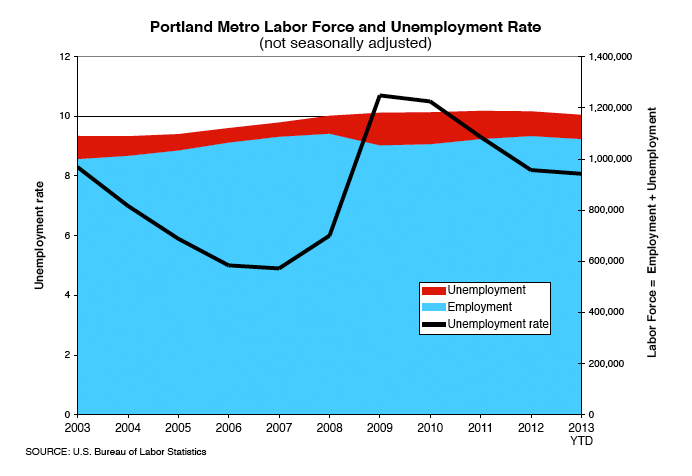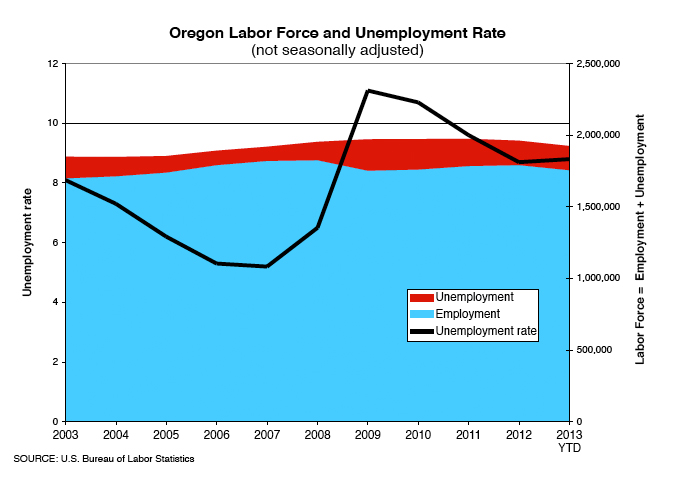BY BRANDON SAWYER | OB RESEARCH EDITOR
 Unemployment is down but so is the labor force as discouraged workers desert, baby boomers retire and the economy sputters along. In the year ending in April, Portland’s labor force fell 1.7% and statewide it dropped 1.9%. Has Portlandia‘s “Dream of the ’90s” evaporated?
Unemployment is down but so is the labor force as discouraged workers desert, baby boomers retire and the economy sputters along. In the year ending in April, Portland’s labor force fell 1.7% and statewide it dropped 1.9%. Has Portlandia‘s “Dream of the ’90s” evaporated?
BY BRANDON SAWYER | OB RESEARCH EDITOR
 Unemployment is down but so is the labor force as discouraged workers desert, baby boomers retire and the economy sputters along. Has Portlandia‘s “Dream of the ’90s” evaporated?
Unemployment is down but so is the labor force as discouraged workers desert, baby boomers retire and the economy sputters along. Has Portlandia‘s “Dream of the ’90s” evaporated?
Last month, a geographer from Pittsburgh wrote a brief article for Pacific Standard with the subtle title,”Portland Is Dying.” A few members of the “Portland is anti-business” crowd were happy to oblige his celebration of Portland’s demise with knowing comments, but it also drew criticism from Rose City defenders.
The basis of his argument was that Portland’s labor force – an estimate of both employed and unemployed folks – had shrunk by nearly 25,000 in the year ending March 2013. This does not necessarily signal a loss of jobs; it could also be attributed to a loss of unemployed job seekers.
Looking further into the data, more recent April numbers from the Oregon Employment Department show Portland Metro’s labor force down about 21,000 people, or -1.7% between April 2012 and April 2013. In Seattle-Tacoma the labor force grew by nearly 24,000 or +1.3% during the same period. Oregon-wide it fell more than 38,000, or -1.9% while it remained flat in Washington, and grew half a percent nationally.

Portland is currently the 23rd largest metro by size of labor force, and among the top 25 metros only Portland and St. Louis lost labor force during the year ended in April. Twelve of them, including Seattle, increased their labor force more than a one percent, with Houston leading the pack at +2.5% or 74,000. Most likely, the gains being made by metros these days are through employment, since unemployment rates are falling across most of the nation. Portland’s unemployment rate is also down, but lately this is because unemployment is falling faster than employment. Portland was one of the six top 25 metros that lost labor force in 2012, too, though it only fell by a tenth of a percent.
Oregon, meanwhile, had the second biggest labor force dip, after Connecticut at -2.0%, for the year ended in April among 15 states that saw declines. Only eight states had increases greater than one percent, led by Utah at +2.7% and North Dakota at +2.6%.

State employment economist Nick Beleiciks says three factors are hampering growth in labor force, both in Oregon and other parts of the country:
- Aging population: Now that the stock market has recovered from the Great Recession, Baby boomers are retiring in greater numbers and Oregon has an older population than most states.
- Fewer teenagers are working: Discouraged by a lackluster job market and competition from older job-seekers, teenagers are relying more on their parents for pocket change.
- The sluggish economy: The recovery has not been entirely “jobless” but economists have long been lamenting weak employment gains.
Beleiciks also noted that Oregon’s labor force participation rate – labor force participants divided by all who could conceivably be working – reached its lowest point in April, 61.9%, since state economists began recording it in the late ’70s. The national rate has also taken a dramatic plunge in the last five years and was at 63.3% in April. Last year a blog on The Washington Post decried the falling rate and its potential to shrink the labor force..
It’s worth noting that the labor force is figured using the Current Population Survey (CPS) of households, which of course also measures employment. It showed employment in Portland Metro down almost 6,500 jobs in the year ended in April. But a better measure of employment, according to Beleiciks is found in the Current Employment Statistics (CES) survey or employers, which shows Portland Metro gained 21,800 jobs in that time.
Perhaps young people really do come to Portland to retire, abandoning the labor force or maybe the “jobless recovery” is just hitting harder here. Whether city and state declines are part of an ongoing trend, or jsut a hiccup along the path, remains to be seen.
Research editor Brandon Sawyer digs heaps of data about privately-held and public companies, economics and industries, and extracts relevant articles, graphs and lists, including the 100 Best Companies, Nonprofits and Green Companies to Work For in Oregon.


